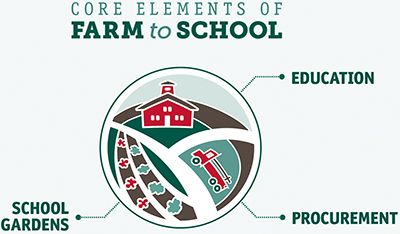How a can-do attitude led to “Farm to School”

42% of schools in the United States, 42,587 of them, take part in the Farm To School Program. Harwood is one of them!
The Farm to School program enriches the connection communities have with fresh, healthy food and local food producers by changing food purchasing and education practices at school.
The program aims for “students [to gain] access to healthy, local foods as well as education opportunities such as school gardens, cooking lessons, and farm field trips.”

Erika Dolan and Paul Morris, Harwood’s Food and Nutrition Co-Directors, work together to ensure that the HUUSD Food & Nutrition Program delivers high-quality meals to all students in our District.
“It is a combination of all my interests and professional pursuits,” said Paul Morris, the facilitator of the Farm to School Program at Harwood. “It is an opportunity for me to get students to think about the bigger connections in the world in a way that is fun and delicious.”
He is proud of being in a long tradition at Harwood. “I’m just one small piece in the larger work that has been done by a lot of amazing teachers here in the building. And they really are the ones that deserve credit for focusing students’ attention on sustainability in the big picture,” he said. “I’m only building off the amazing work that the science department, the middle school, Mr. Wagner and Mr. Henchen have done, [what] Mr. MacLeod has promoted. I am really just a helper in the work that these people founded.”
In Paul’s first year at Harwood, he was asked by the previous principal if he wanted to attend the Farm to School summit. His answer was, “Sure, let’s do it.” And that is how it all began. “I brought some students and some stuff, and realized that there are very few obstacles to making this happen here at Harwood.”
He worked closely with the kitchen staff to start a Farm to School club at HUHS, and has slowly been progressing with the support of local organizations like Vermont Feed, NOFA Vermont and Green Mountain Harvest Hydroponic to make it happen at our school.
The mission statement of the Farm to School Program at Harwood is to honor and support the work the cafeteria does, and their from-scratch meals program, meaning that 90% of the food that we have at Harwood is made in-house, as opposed to being frozen and reheated.
“Our other main mission is to get students aware of the food choices they make and how it impacts themselves, the environment and their community,” said Morris. “In the Farm to School club we do things that support the community, the classroom, and, most importantly, the cafeteria.”
“We’re intending on getting a crew of students to work with Living Tree, develop some curriculum around sustainable food practices and food systems, and then deliver that to elementary and middle school,” said Morris. The Farm to School club is working to get a pilot program off the ground where they could take the unopened milk students leave from breakfast and uneaten fruit and organize its transportation to a food pantry. Another idea that they focus on is developing a wellness garden that needed to be dug up because of a weed infestation.
The club has been great in putting students in leadership positions. “We have a number of students who have advocated on the state level to our local legislature,” said Morris. “We had one student who met with our U.S. Senator, Patrick Leahy, and the Secretary of Agriculture of the United States, Thomas Vilsack.” Putting students in leadership positions allowed them to flex their skills and represent Harwood. “Doing that and making sustainability issues heard has been really rewarding,” said Morris.


